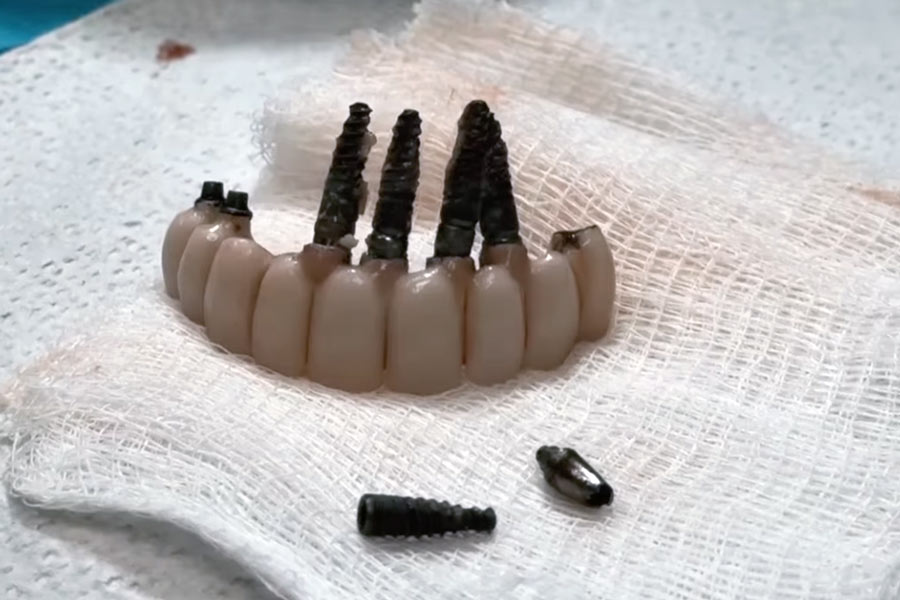- Home
- What to Do If Your Dental Implant Is Failing: A Doctor’s Guide to Handling Implant Rejection
What to Do If Your Dental Implant Is Failing: A Doctor’s Guide to Handling Implant Rejection
08 Apr 2025

Dental implants have become the gold standard for replacing missing teeth, offering durability, aesthetics, and function. But like any medical procedure, they aren’t 100% immune to complications. If you’re experiencing discomfort, swelling, or mobility around your dental implant, you might be wondering: “Is my implant being rejected?” While true implant rejection is rare, early intervention is key to preventing further problems. In this article, I’ll walk you through:
- The signs of implant failure
- What causes it
- How we diagnose and treat it
- What your options are moving forward
Let’s turn fear into confidence with the facts.
Is Implant Rejection Real? Understanding What’s Actually Happening
Unlike organ transplants, dental implants are made from biocompatible titanium or zirconia, materials that the body typically accepts very well. So, when we talk about “rejection,” we’re usually referring to implant failure caused by other factors.
Types of Implant Failure:
- Early failure – Occurs within the first few months before the implant fully integrates with the jawbone.
- Late failure – Happens years later due to infection, trauma, or overloading.
Top 6 Signs Your Dental Implant May Be Failing
If you notice any of the following, contact your implant dentist immediately:
- Persistent pain or throbbing at the implant site
- Swelling, redness, or pus around the gums
- Loose or wobbly implant or crown
- Difficulty chewing or biting
- Gum recession around the implant
- Foul odor or bad taste in the mouth
Insert Infographic: “6 Warning Signs of Dental Implant Failure”
What Causes an Implant to Fail or Be ‘Rejected’?
-
Peri-Implantitis (Infection)
An inflammatory condition that affects the gum and bone around the implant, often caused by poor oral hygiene or existing gum disease. -
Poor Osseointegration
The implant fails to fuse with the jawbone, usually due to low bone density, smoking, or uncontrolled health conditions. -
Overloading
Putting too much force on the implant (e.g., biting hard foods too soon) can disrupt healing or damage the surrounding bone. -
Medical Conditions
Uncontrolled diabetes, autoimmune disorders, or osteoporosis can impair healing. -
Smoking and Alcohol Use
Both impair blood flow and slow healing. -
Surgical Technique or Low-Quality Materials
Implants placed without proper planning or using poor-quality components are more prone to failure.
Step-by-Step: What to Do If You Suspect Implant Rejection
Step 1: Don’t Panic—Call Your Implant Dentist
Prompt evaluation is key. Many minor complications can be corrected if caught early.
Step 2: Get a Full Assessment
We’ll perform:
- A clinical examination
- Digital X-rays or CBCT scan to check bone health
- Possibly a microbial test if infection is suspected
Step 3: Immediate Management
Depending on the cause and severity:
- Deep cleaning and antibiotics for mild peri-implantitis
- Laser therapy or antimicrobial rinses
- Splinting if the implant is slightly mobile
Step 4: Implant Removal (If Necessary)
In cases of severe infection, bone loss, or failed integration, the implant may need to be removed. The area is cleaned and allowed to heal.
- Bone grafting may be required to rebuild the site.
- A new implant can often be placed after 3–6 months.
Doctor’s Note: “We’ve replaced hundreds of failed implants with excellent long-term success. One setback doesn’t mean you can’t move forward.”
Can You Get Another Implant After Rejection?
Yes—in most cases. Once the underlying issue is resolved (infection cleared, bone rebuilt, or risk factors controlled), you can often try again with great success. We may use:
- Different implant designs (shorter, wider, or angled)
- Zygomatic implants for severe bone loss
- Guided implant surgery for precise placement
How to Prevent Implant Failure in the First Place
1. Maintain Excellent Oral Hygiene
Brush twice daily, floss, and use a water flosser if needed.
2. Keep Up With Dental Visits
Regular cleanings and checkups help catch issues early.
3. Manage Chronic Conditions
Work with your physician to control diabetes, autoimmune disease, or bone
health.
4. Avoid Smoking and Excessive Alcohol
Quit before surgery and during the healing phase.
5. Follow Post-Op Instructions
Stick to soft foods, avoid pressure, and use prescribed rinses or medications.
Real Patient Story: Linda’s Second Chance at a New Smile
Linda, 62, had her first implant fail due to undiagnosed peri-implantitis. After we removed it, performed a bone graft, and stabilized her gum health, she received a second implant—and it’s still going strong 5 years later.
Linda’s words: “I was devastated when I thought I lost my chance. But now, I smile without pain or fear.”
Final Thoughts: Rejection Isn’t the End—It’s a New Beginning
Dental implant failure is rare, but it can happen. The key is to act fast, get the right diagnosis, and follow a strategic plan. At Zahn Implant Club, we specialize in managing complex implant cases, including replacement and retreatment. Whether you’re worried about a current implant or want to start fresh after a previous failure, we’re here to help.
Call us at 916-258-7434 or visit Schedule a Free Consultation to book an appointment and take the first step toward a healthier, more confident smile!
-
4913 Golden Foothill Pkwy
El Dorado Hills, CA 95762 - 916-258-7434
- [email protected]
